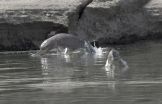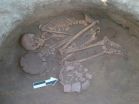(Press-News.org) Removal of river water for irrigation and habitat fragmentation by irrigation dams were shown to be the principal factors contributing to the decline of the Indus river dolphin, according to a study published July 16, 2014 in the open-access journal PLOS ONE by Gill Braulik from the Wildlife Conservation Society and University of St. Andrews and colleagues.
Many freshwater marine mammals are endangered due to rapidly degrading habitat and conservation of these megafauna species depends on maintaining intact habitat. This study used historical range data and information on dolphin presence from fisher interviews to better understand the timing pattern of range decline of the Indus River Dolphin, an endangered freshwater dolphin that inhabits one of the most modified rivers in the world. Additionally, the authors' modeled seven potential explanations of declining range, including date of construction of the nearest dam, dry season river discharge, distance from the edge of the former range and length of river section to identify the factors responsible for the decline.
Results indicate that the historical range of the Indus dolphin has been fragmented into 17 river sections by diversion dams. River dolphins disappeared from ten river sections, still live in six, and are of unknown status in one section. Scientists found that low dry-season river discharge, due to irrigation at diversion dams, was the principal factor that explained the dolphin's range decline and that dolphins were more likely to persist in the core of the former range, likely due to the concentration of water diversions and dams near the range periphery. The authors suggest this study may provide insight in how other river vertebrate populations may respond to planned dams and water developments.
Dr. Braulik added, "This important study shows that it is river habitat fragmentation by dams, and removal of river water for irrigation that has caused the massive range decline of the Indus River freshwater dolphin. This increased understanding of species decline in fragmented river systems is especially important because hundreds of new dams and water developments are planned or are under construction in many of the world's rivers and large losses of aquatic biodiversity can be expected."
INFORMATION:
In your coverage please use this URL to provide access to the freely available paper: http://dx.plos.org/10.1371/journal.pone.0101657
Citation: Braulik GT, Arshad M, Noureen U, Northridge SP (2014) Habitat Fragmentation and Species Extirpation in Freshwater Ecosystems; Causes of Range Decline of the Indus River Dolphin (Platanista gangetica minor). PLoS ONE 9(7): e101657. doi:10.1371/journal.pone.0101657
Funding: World Wildlife Fund-Pakistan -(http://www.wwfpak.org/) funded the interview surveys with support through the Pakistan Wetlands Project. The US Marine Mammal Commission (http://www.mmc.gov) provided funding to GB for reporting and analysis in grant number E4047595. The funders had no role in study design, data collection and analysis, decision to publish, or preparation of the manuscript.
Competing Interest: The authors have declared that no competing interests exist.
Indus river dolphin's declining range
Patterns of river fragmentation provide insight into river dolphin conservation
2014-07-16
ELSE PRESS RELEASES FROM THIS DATE:
Transplanting gene into injured hearts creates biological pacemakers
2014-07-16
LOS ANGELES (STRICTLY EMBARGOED UNTIL 2 P.M. EDT ON JULY 16, 2014) – Cardiologists at the Cedars-Sinai Heart Institute have developed a minimally invasive gene transplant procedure that changes unspecialized heart cells into "biological pacemaker" cells that keep the heart steadily beating.
The laboratory animal research, published online and in today's print edition of the peer-reviewed journal Science Translational Medicine, is the result of a dozen years of research with the goal of developing biological treatments for patients with heart rhythm disorders who currently ...
Sexual harassment and assault are common on scientific field studies, survey indicates
2014-07-16
CHAMPAIGN, Ill. — A survey of 142 men and 516 women with experience in field studies in anthropology, archaeology, geology and other scientific disciplines reveals that many of them – particularly the younger ones – suffered or witnessed sexual harassment or sexual assault while at work in the field.
A majority of the survey respondents (64 percent) said they had experienced sexual harassment (inappropriate sexual remarks, comments about physical beauty or jokes about cognitive sex differences, for example). And more than 20 percent reported they had been the victims ...
Potassium supplements may increase survival in patients taking diuretics for heart failure
2014-07-16
PHILADELPHIA—Researchers from the Perelman School of Medicine at the University of Pennsylvania found that patients taking prescription potassium supplements together with loop diuretics for heart failure have better survival rates than patients taking diuretics without the potassium. Moreover, the degree of benefit increases with higher diuretic doses. The team, including senior author Sean Hennessy, PharmD, PhD, associate professor of epidemiology in Penn's Center for Clinical Epidemiology and Biostatistics (CCEB), report their findings in a study published online July ...
Preeclampsia may share cause with disorders such as Alzheimer's
2014-07-16
New research has identified a potential cause of and a better diagnostic method for preeclampsia, one of the most deadly and poorly understood pregnancy-related conditions in the world. The international team, led by researchers at Nationwide Children's Hospital, discovered that the disease may result from a collection of protein mishaps like those associated with Alzheimer's disease. Their findings, released today by Science Translational Medicine, have already led to an affordable, fast and accurate urine test that could revolutionize the diagnosis of preeclampsia in ...
Walking on all fours is not backward evolution, study shows
2014-07-16
VIDEO:
This video is a sample of UTS walking patterns.
Click here for more information.
AUSTIN, Texas -- Contradicting earlier claims, "The Family That Walks on All Fours," a group of quadrupedal humans made famous by a 2006 BBC documentary, have simply adapted to their inability to walk upright and do not represent an example of backward evolution, according to new research by Liza Shapiro, an anthropologist at The University of Texas at Austin.
Five siblings in the family, ...
New study links dredging to diseased corals
2014-07-16
In a world-first study published today, researchers say dredging activity near coral reefs can increase the frequency of diseases affecting corals.
"At dredging sites, we found more than twice as much coral disease than at our control sites," says the lead author of the study, Joe Pollock, a PhD candidate from the ARC Centre of Excellence for Coral Reef Studies (Coral CoE) at James Cook University (JCU) and the Australian Institute of Marine Science (AIMS).
"Corals require both light and food to survive," Pollock explains. "And unfortunately, dredging impacts corals ...
Tooth plaque provides unique insights into our prehistoric ancestors' diet
2014-07-16
This news release is available in French. This news release is available in French. This news release is available in French.
An international team of researchers has found new evidence that our prehistoric ancestors had a detailed understanding of plants long before the development of agriculture.
By extracting chemical compounds and microfossils from dental calculus (calcified dental plaque) from ancient teeth, the researchers were able to provide an entirely new perspective on our ancestors' diets. Their research suggests that purple nut sedge (Cyperus ...
Tooth plaque provides insight into our prehistoric ancestors' diet
2014-07-16
A new study may provide evidence that our prehistoric ancestors understood plant consumption and processing long before the development of agriculture, according to a study published July 16, 2014 in the open-access journal PLOS ONE by Stephen Buckley from University of York and colleagues.
Evidence of plant consumption before the adoption of agriculture is difficult to find; such evidence is meaningful for understanding how much prehistoric people knew about the ecology and potential therapeutic properties of plants. Scientists in this study extracted and analyzed chemical ...
The 'obesity paradox': Cardiovascular mortality lowest among overweight patients
2014-07-16
Rochester, MN, July 16, 2014 – High body mass index (BMI) is associated with multiple cardiovascular diseases. However, emerging data suggest that there is an "obesity paradox," that being overweight may actually protect patients from cardiovascular mortality. Investigators have now confirmed that the risk of total mortality, cardiovascular mortality, and myocardial infarction is highest among underweight patients, while cardiovascular mortality is lowest among overweight patients, according to two reports published today in Mayo Clinic Proceedings.
Currently more than ...
Brain of world's first known predators discovered
2014-07-16
An international team of paleontologists has identified the exquisitely preserved brain in the fossil of one of the world's first known predators that lived in the Lower Cambrian, about 520 million years ago. The discovery revealed a brain that is surprisingly simple and less complex than those known from fossils of some of the animal's prey.
The find for the first time identifies the fossilized brain of what are considered the top predators of their time, a group of animals known as anomalocaridids, which translates to "abnormal shrimp." Long extinct, these fierce-looking ...
LAST 30 PRESS RELEASES:
Mayo Clinic study finds single dose of non-prescribed Adderall raises blood pressure and heart rate in healthy young adults
Engineered immune cells show promise against brain metastases in preclinical study
Improved EV battery technology will outmatch degradation from climate change
AI cancer tools risk “shortcut learning” rather than detecting true biology
Painless skin patch offers new way to monitor immune health
Children with poor oral health more often develop cardiovascular disease as adults
GLP-1 drugs associated with reduced need for emergency care for migraine
New knowledge on heritability paves the way for better treatment of people with chronic inflammatory bowel disease
Under the Lens: Microbiologists Nicola Holden and Gil Domingue weigh in on the raw milk debate
Science reveals why you can’t resist a snack – even when you’re full
Kidney cancer study finds belzutifan plus pembrolizumab post-surgery helps patients at high risk for relapse stay cancer-free longer
Alkali cation effects in electrochemical carbon dioxide reduction
Test platforms for charging wireless cars now fit on a bench
$3 million NIH grant funds national study of Medicare Advantage’s benefit expansion into social supports
Amplified Sciences achieves CAP accreditation for cutting-edge diagnostic lab
Fred Hutch announces 12 recipients of the annual Harold M. Weintraub Graduate Student Award
Native forest litter helps rebuild soil life in post-mining landscapes
Mountain soils in arid regions may emit more greenhouse gas as climate shifts, new study finds
Pairing biochar with other soil amendments could unlock stronger gains in soil health
Why do we get a skip in our step when we’re happy? Thank dopamine
UC Irvine scientists uncover cellular mechanism behind muscle repair
Platform to map living brain noninvasively takes next big step
Stress-testing the Cascadia Subduction Zone reveals variability that could impact how earthquakes spread
We may be underestimating the true carbon cost of northern wildfires
Blood test predicts which bladder cancer patients may safely skip surgery
Kennesaw State's Vijay Anand honored as National Academy of Inventors Senior Member
Recovery from whaling reveals the role of age in Humpback reproduction
Can the canny tick help prevent disease like MS and cancer?
Newcomer children show lower rates of emergency department use for non‑urgent conditions, study finds
Cognitive and neuropsychiatric function in former American football players
[Press-News.org] Indus river dolphin's declining rangePatterns of river fragmentation provide insight into river dolphin conservation




